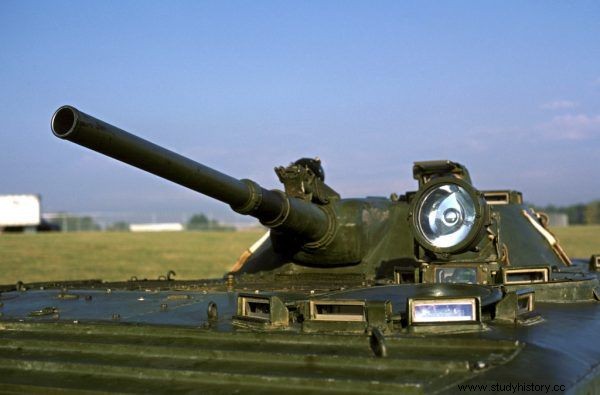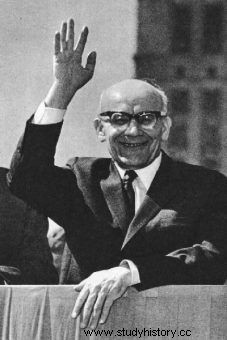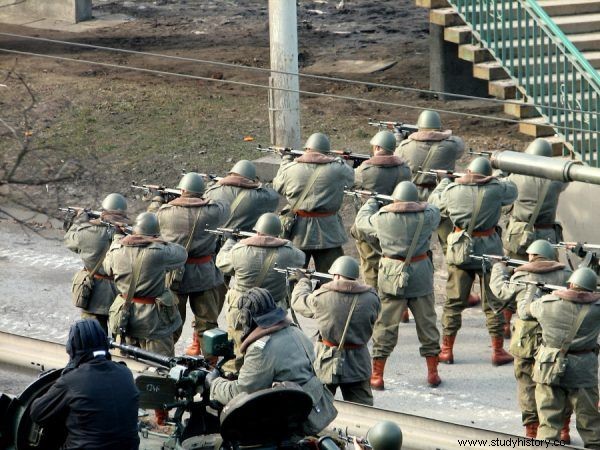Why was the coastal massacre in December 1970? A new article by prof. Andrzej Chojnowski suggests that it was the result of a military conspiracy against Władysław Gomułka. Its prominent participant was to be General Wojciech Jaruzelski.
While there is no shortage of research into the events of the 1970s, many issues still need to be clarified. Historians are wondering, among other things, why the decision to introduce the increases was announced by the authorities at the worst possible moment. Why were peaceful solutions abandoned and a brutal crackdown on protesters chosen? Where did the decision chaos then come from? Although it is well known that there was a struggle for influence at the top of power in the People's Republic of Poland, there was no hard evidence of a plot against Gomułka. It was also difficult to indicate who would be the initiator and leader of the conspiracy against the party's first secretary. This was at least the case until the publication of the article by prof. Chojnowski.

Has Władysław Gomułka paid the opposition to the plans to build a license version of the BWP-1 with the authorities? (photo:public domain).
Sensational documentary
The aforementioned historian came across a previously unknown party document. This is the minutes of the meeting of the Central Committee of the Polish United Workers' Party of February 25, 1969. What is the result of it?
In the political dimension, the incident presented in the document has an aftertaste of sensation. A group of the most important party and state dignitaries decided, without the knowledge of the First Secretary of the Central Committee of the Polish United Workers' Party, to undertake cost-intensive production by introducing it partially effective. [...] The information that emerges from the document is astonishing that since the 1960s the government made military decisions "in a narrower group, without a protocol" (...).
It was about starting the production of the TB-40 infantry fighting vehicle, which was to be a license version of the BWP-1 - a vehicle that is still used by the Polish Army . Władysław Gomułka found out about the undertaking only after the fact and decided to block the works. According to the scholar, it is possible that in this way the first secretary signed a political verdict on himself .

Władysław Gomułka was reluctant to armaments, which made him probably dangerous enemies (photo:public domain).
Jaruzelski, Gierek, Moscow
Prof. Chojnowski points out that at the turn of the 1960s and 1970s:
The military expected (...) recognition of its growing position in the power system and certainly demanded funds for the expansion and modernization of its structures. In both areas, it met with resistance from Władysław Gomułka, with the first secretary's reluctance to increase the financial outlays for armaments of major importance.
Indeed, after Władysław Gomułka stepped down, the funds flowed in a broad stream to the armed forces of the People's Republic of Poland. The army received, among others over 1000 tanks.

Did the army play a double role in December '70? (Staged on the set of "Black Thursday"; photo:Starscream, CC BY-SA 3.0).
The facts speak for themselves:from the various interest groups in the People's Republic of Poland, none of them was so concerned with removing the party leader as with the industrial-military complex.
General Wojciech Jaruzelski was to play a key role in the plot, and the claims to exclude him from command in December 1970 were to be an element of cynical obliteration of his tracks. According to the quoted historian, it was the then Minister of National Defense who decided during the meeting on December 18 to change the position of the first secretary.
Moscow was also supposed to help change the leadership of the Polish United Workers' Party. In her opinion, Edward Gierek guaranteed care for Soviet interests in Poland, as opposed to Gomułka, who was trying to maintain a relative independence.

The news is based on a scientific article published in the periodical "Dzieje Latest".
It is difficult to define the role of the conspirators in deciding on the pay rises, but it seems reasonable to suppose that they prepared to resolve the issue of the expected protests by force. Then Gomułka was held responsible and forced to resign.
The source of the above news is:
Andrzej Chojnowski, Who removed Władysław Gomułka from power? Contribution to the genesis of December '70 , "History of the Latest", 46 (2014), no. 1, pp. 189-206.
Historical news. What's the matter?
 | The "historical news" column is the latest news from the world of history. We are looking for missed and concealed discoveries of Polish (and not only) scientists. We show that there is always something going on in research on the past. |
 | Our news is short and accessible. On 2-3 thousand signs, we will summarize for you the discoveries that scientists have made on dozens of pages of hermetic works. We only write about what really matters. No boring. |
 | We rely on scientific publications from the last 18 months . In the world of history, news spreads slowly, and academic works reach potential recipients with a long delay. What in other fields ceases to be news after 24 hours in history, it may even be a year later. |
 | When preparing news, we follow the list of the most prestigious historical periodicals. If you are a publisher or author and would like us to reach for a specific publication - please send it to our editorial office. |
